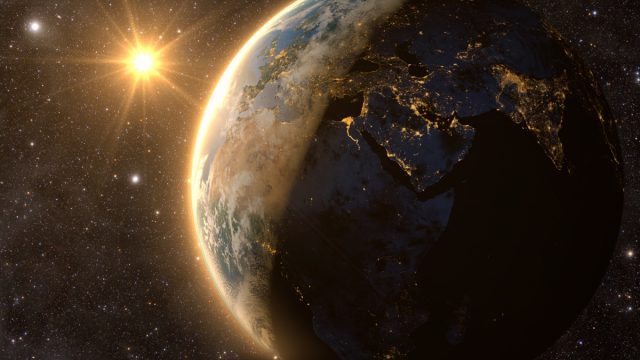Earth is Spinning Faster than Usual and Here’s How it’s Already Affected You
Some think it could be dangerous.

If it seems the days are getting shorter; they are and have been since the summer solstice in June. But the earth recently recorded its shortest day for an entirely different and unusual reason—the earth is spinning faster. Scientists have found the development puzzling, although they have some theories about why it’s happening and what impact it may have on our lives.

June 29, 2022 was 1.59 milliseconds shorter than the average day, scientist Leonid Zotov told CBS News. The normal length of a day is 24 hours, or 86,400 seconds. But in the past few years, the Earth’s rotation has picked up, trimming milliseconds off some days. “Since 2016 the Earth started to accelerate,” said Zotov, who published a study last March on what might be causing the changes in Earth’s rotation. “This year it rotates quicker than in 2021 and 2020.”

This increased rotation doesn’t shorten every day—just every once in a while. But if it continues, the main way of measuring time on Earth—a universal, high-precision method known as atomic time—may need to change. A negative leap second might need to be added, in which clocks would simply skip one second. “Since we can not change the clock arrows attached to the Earth rotation, we adjust the atomic clock scale,” said Zotov.
RELATED: Two Galaxies Crashed Together and This Is What it Looked Like After

But not all scientists are in favor of the negative leap second. In fact, Meta engineers Oleg Obleukhov and Ahmad Byagowi, recently wrote a blog post criticizing the idea. They said it could cause serious glitches in technology, such as data corruption. The concept has never been tested.

Some scientists theorize the Earth’s tides. Others think the constant melting and refreezing of the polar ice caps is causing the earth’s rotation to speed up and slow down.
“It is all about the law of conservation of momentum that applies to our planet Earth. Every atom on the planet contributes to the momentum of the earth’s angular velocity based on the distance to the rotation axis of the earth,” Obleukhov and Byagowi told CBS. “So, once things move around, the angular velocity of the earth can vary.”

“This phenomenon can be simply visualized by thinking about a spinning figure skater, who manages angular velocity by controlling their arms and hands,” they said. “As they spread their arms the angular velocity decreases, preserving the skater’s momentum. As soon as the skater tucks their arms back in, the angular velocity increases. Same happens here at this moment because of rising temperatures on Earth. Ice caps melt and lead to angular velocity increase.”

In 2020, the planet experienced 28 of its shortest days in the past 50 years. The United Nations-affiliated international Telecommunication Union has started adding occasional leap seconds in June or December. The first leap second was added in 1972, and 26 have been added since.
According to Ars Technica, during a leap second, the clock ticks from 23:59:59 to 23:59:60 to 00:00:00. The middle “leap second” has caused tech problems in the past: A leap second added in 2012 caused crashes at Reddit, Gawker, and the Australian airline Qantas. In 2017, a leap second took down Cloudflare.














